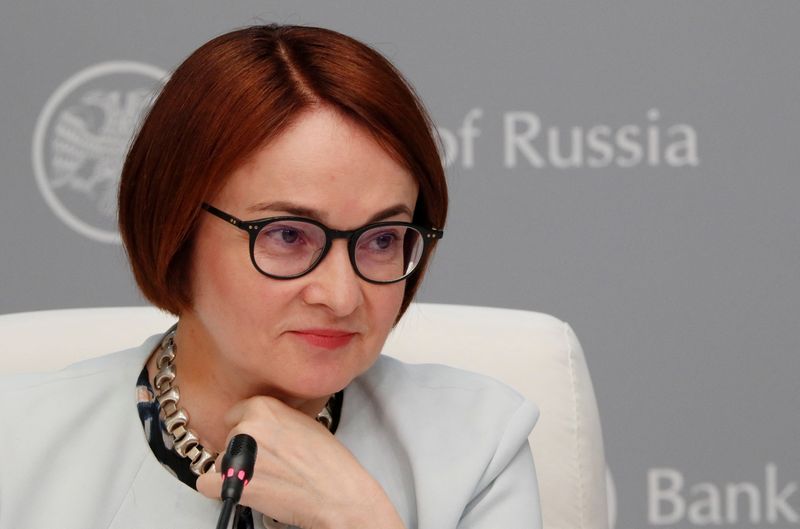– In March 2021, as the Bank of Russia hiked interest rates for the first time in three years, Governor Elvira Nabiullina wore a brooch in the shape of a hawk – the latest in series of such sartorial nods to policy picked up by the Russian media.
Less than a year later, black-clad and grim-faced, Nabiullina announced she was more than doubling the bank’s policy rate to 20% and imposing some capital controls as Russia faced deepening economic isolation over its invasion of Ukraine.
That emergency rate is expected to stay when the central bank meets on Friday. But limiting the damage from the conflict could force Nabiullina, who put inflation-targeting at the centre of policy, off the path of monetary orthodoxy.
Economists polled by central bank last week expected the economy to shrink 8% this year while inflation reaches 20% as Russia buckles under the economic backlash from its invasion, which Moscow has described as a special operation.
Renaissance Capital economist Sofia Donets said Nabiullina’s firmness and consistency had made her an “exceptional” governor, but added: “Now the game rules are changing again and this is not the central bank’s choice – a new challenge may require rewriting the handbook.”
INFLATION FIGHTER
A surprise appointment in 2013, 58-year-old Nabiullina, an economist and former advisor to President Vladimir Putin, is the first woman to chair the central bank, one of Russia’s most respected institutions.
She soon established herself as a committed inflation fighter, resisting calls from powerful industrialists and the Economy Ministry for interest rate cuts to revive growth.
“Nabiullina’s brooches” added a playful twist to an otherwise technocratic image.
“To support economic growth we need to lower inflation. This is our main goal,” she said early in her term. “Let me say it again: monetary stimulus would not be effective in our view.”
In December 2021 Nabiullina told Reuters that inflation staying high could undermine the central bank’s credibility.
Those early comments showed her in tune with ordinary people, who told pollsters inflation was Russia’s most pressing economic problem. She held that line for years, staunchly defending it against challengers from within Putin’s entourage.
“Nabiullina has established a really strong reputation as an inflation hawk and a credible central bank governor. She floated the rouble and the (central bank) has cleaned up large parts of the banking sector under her watch,” Capital Economics chief emerging markets economist William Jackson said.
“It seems clear that she must have had Putin’s support to do this.”
CRISIS MEASURES
In 2014, a plunge in prices for oil, Russia’s main export, tipped the economy into crisis. At the same time, Putin’s annexation of Crimea from Ukraine provoked western sanctions and an investor stampede out of Russian assets.
Nabiullina’s decision to let the rouble fall caused pain for Russians who saw their savings in dollar terms wiped out while prices of imported goods shot up. A 650 basis point rate hike was Russia’s biggest since the 1998 financial crisis, superseded only by that on Feb. 28.
But her policies were credited with staving off an economic meltdown and Nabiullina won several awards for central banking.
Floating the rouble rather than spending to prop it up helped Nabiullina build up some $640 billion of gold and foreign exchange reserves to insulate the economy against future crises – only to find, as Russians queued to salvage their savings in February, that sanctions meant she could not use them.
Asked in December about reserve management, she said it took into account geopolitical as well as economic risks.
The Ukraine crisis has already necessitated capital controls, which Nabiullina had long opposed, and she may yet be forced to drop her focus on inflation as a policy goal.
“Either the economy operates in a market mode, when capital flows are formed based on market factors such as exchange rate and key rate, or capital can no longer move freely, and then the role of the key rate as a policy instrument is sharply reduced,” Alfa Bank’s chief economist Natalia Orlova said.
TIME UP?
A rare female at the top of Russian officialdom, Nabiullina made a point of hiring others. She and monetary policy deputy Ksenia Yudayeva were described in a 2013 profile as the most qualified team in the central bank’s history.
Her modernising drive also saw an institution which a few years before had not even disclosed the dates of its meetings hold regular news briefings, although the central bank has said she will not take questions on Friday.
One unknown is whether Nabiullina will stay on when her current term expires in June. The central bank declined to comment on that issue although the rules say Putin must nominate her or another candidate by March 24.
The Ukraine crisis “will accelerate Russia’s shift towards isolation and autarky”, Jackson at Capital Economics said, a break from the policy stances Nabiullina has championed.
“While I don’t think Nabiullina’s credibility as a policymaker is necessarily being questioned, it’s unclear whether she will actually be able to revert to the macroeconomic orthodoxy that she introduced,” he said.
(Reporting by Reuters)
